Relevant Overviews
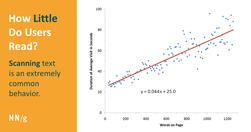
On the average Web page, users have time to read at most 28% of the words during an average visit; 20% is more likely.
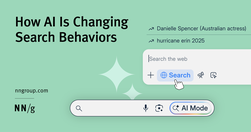
Summary: Our study shows that generative AI is reshaping search, but long-standing habits persist. Many users still default to Google, giving Gemini a fighting chance.

Each product has a unique user base with distinct behaviors and preferences. Applying generic strategies without understanding the specific user base is like trying to solve a puzzle while blindfolded.
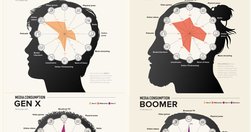
With frequent myths and actual behavior patterns that go beyond heavy use of social media
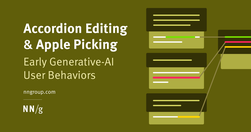
Two new user behaviors are prevalent in interactions with text-based AI chatbots. User research shows the iterative and often complex ways users engage with AI tools for productivity.

Users spend most of their time on other websites, so they expect your site to work like all the other sites they already know. When a design deviates from users’ expectations, usability suffers. Don’t be arrogant and assume that your new design idea is so brilliant that it can overrule decades of user habituation.

People Don’t Read Online—They Scan. This Is How to Write for Them Scanning is searching. Reader’s behavior when scanning may seem pure laziness, but it’s not. It’s an efficient strategy to seek out and filter information. Scanning also allows readers to avoid informational overload.

The more choices a user has to make, the bigger the risk of getting into trouble. More features can easily reduce usability.

A myriad of fields, skills and insights come together to create the overarching discipline of user experience design... Let’s explore five behavioral science insights you can use right now to design better products
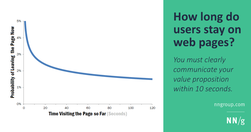
Users often leave Web pages in 10–20 seconds, but pages with a clear value proposition can hold people's attention for much longer. To gain several minutes of user attention, you must clearly communicate your value proposition within 10 seconds.
Users visit websites and use apps to get things done, so emphasize the content of interest to communicate with your audience. Avoid design pollution that decorates the UI with non-communicative elements.

The foundation of user experience is the difference between the people on the design team and the people using the product. You can't ask users to design, but you also can't ask the designers whether their own design will be easy for the target audience to use.

Some UX designers (and many clients) aim to "jazz up" the design to supposedly engage users. This usually backfires because extraneous design elements get in the way of users' tasks.

The smaller the word count (and in general, the more concise your online communication), the more users will comprehend and retain your message.

User research is the methodic study of target users—including their needs and pain points—so designers have the sharpest possible insights to work with to make the best designs. User researchers use various methods to expose problems and design opportunities, and find crucial information to use in their design process.

Qualitative usability testing aims to identify issues in an interface, while quantitative usability testing is meant to provide metrics that capture the behavior of your whole user population.

Imperative voice gets shared. Imperative voice boosts email click, open and read rates.
"understand the digital reader’s brain, and to get a couple of concrete writing tips for your next digital text." "Nothing can surpass a text when it comes to transforming abstract thoughts into concrete expression."

“Daily political events consistently evoked negative emotions [which] predicted worse day-to-day psychological and physical health, but also greater motivation to take action aimed at changing the political system that evoked the negative emotions in the first place.”
Law 1 / Reduce - The simplest way to achieve simplicity is through thoughtful reduction.Law 2 / Organize - Organization makes a system of many appear fewer.Law 3 / Time - Savings in time feel like simplicity.Law 4 / Learn - Knowledge makes everything simpler.Law 5 / Differences - Simplicity and complexity need each other.Law 6 / Context - What lie…

Users have learned to ignore content that resembles ads, is close to ads, or appears in locations traditionally dedicated to ads.
People do not read online: "fundamental scanning behaviors remain constant, even as designs change."